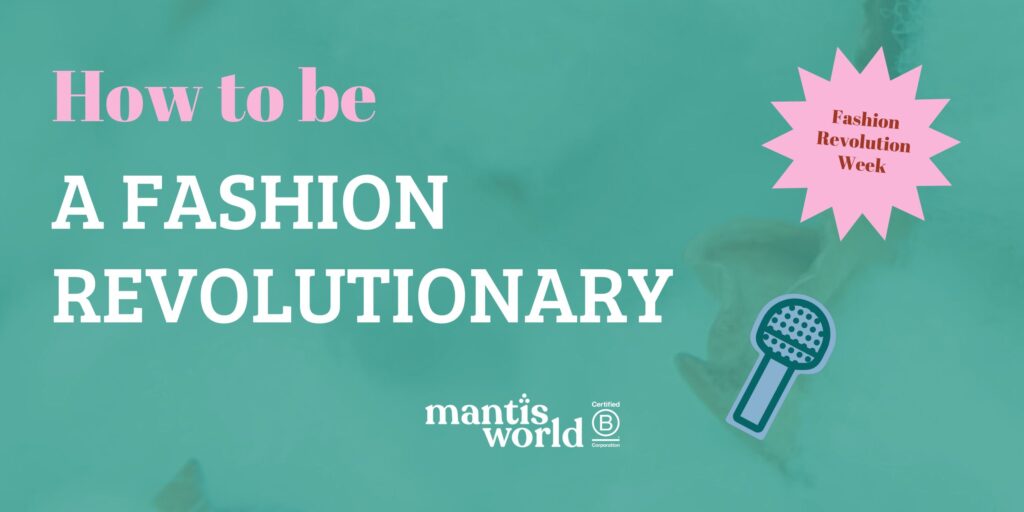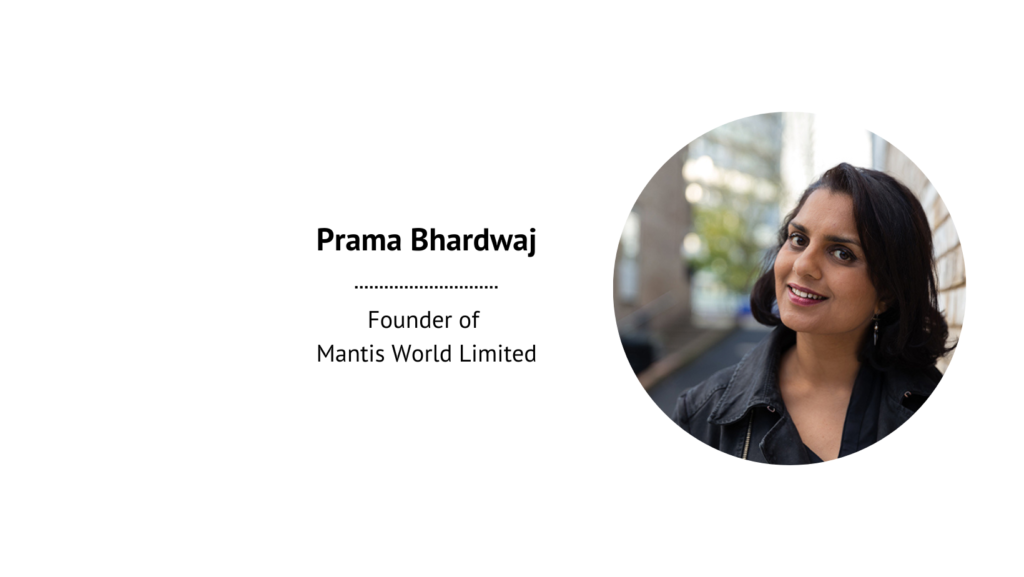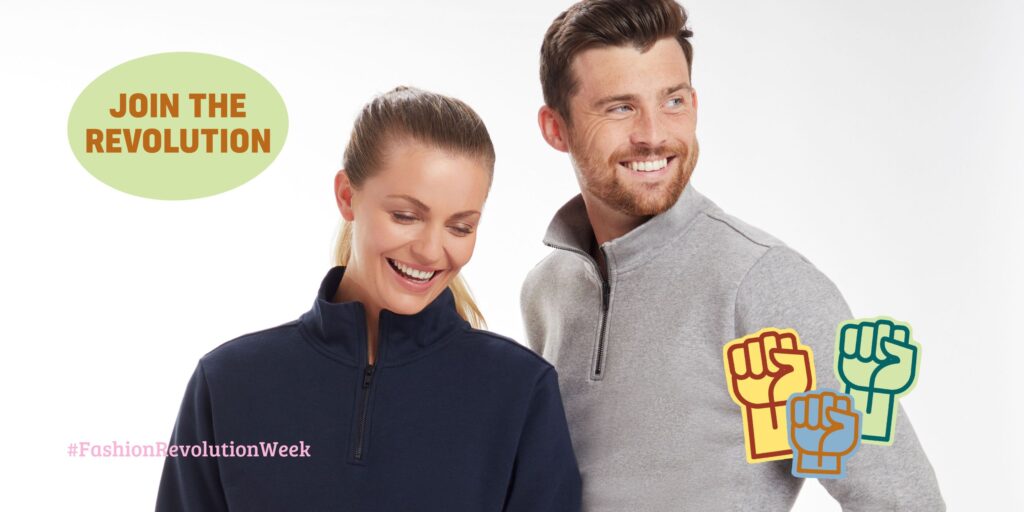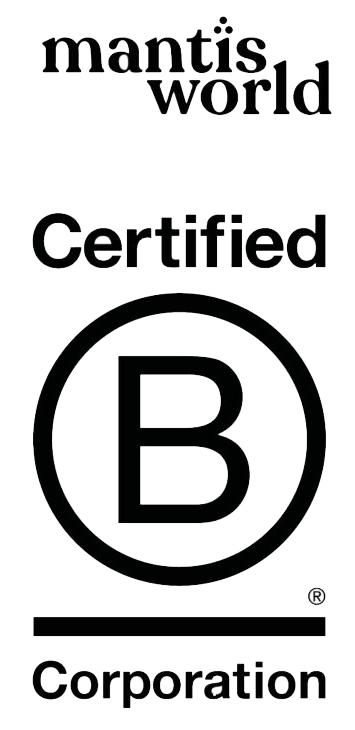Fashion Revolution Week

Fashion Revolution Week is the annual campaign bringing together the world’s largest fashion activism movement for action. Celebrating its 10-year anniversary, this year Fashion Revolution is inviting their community to share a decade of learnings on what it means to be a part of the revolution.
If ever there was a person who embodied what it is to be a Fashion Revolutionary it’s our very own Prama Bhardwaj, so there’s no better time to talk to her about nearly 2½ decades of work.

Prama is the founder & CEO of Mantis World. She will rightly say that everything we talk about has been achieved through teamwork & collaboration, always listing the many, many other revolutionaries & colleagues that continue to be part of the journey, but Prama is undoubtedly the force and energy behind Mantis walls, so while we’re talking Fashion Revolutionaries, we’re talking Prama.
Establishing Mantis World in 2000 Prama has been pushing for sustainable, ethical fashion before the terms were even coined. Considering herself to be both an activist, advocate and educator, working alongside others, Prama is often seen as the voice for organic cotton and sustainable textiles within the printwear industry.
There are so many milestones to consider:
- from first introducing organic cotton to Mantis World ranges in 2005, to completely eliminating all conventional cotton from its production in 2018.
- from being the first to bring out what is now a template for Digital Product Passports through a system of QR codes that show both impact metrics and traceability. A tool that is now being widely rolled out across the industry to prepare for upcoming legislation. (But back in 2020 Prama did it with Green Story because she wanted to not because Mantis World had to!)
- from speaking about manufacturing in Africa and running masterclasses on sustainable manufacture for the Ethical Fashion Forum in 2008 onwards, to contributing towards Fashion Africa (Nairobi), GOTS conference (Addis Ababa), FIT (New York), Copenhagen Business School, Textile Exchange Conferences (Mumbai, Hamburg, Vancouver, Milan), Proudly Made in Africa (House of Lords, London) and chairing the Pan Africa Sourcing Working Group for Textile Exchange…the list goes on.
But Prama’s work is about more than ‘just’ organic cotton and sustainable textiles, it’s also about ethical business.
It’s about promoting female empowerment and encouraging women entrepreneurs. In 2015 organising a screening and expert panel discussion of “The Honor Diaries” highlighting the detrimental effect on women’s rights through cultures of “honour”, in collaboration with Oxfam and LSBU. Also sponsoring a screening of the ‘True Cost’ documentary exploring the true cost of Fast Fashion, organised with Oxfam and The Asian Circle.
It’s about factory rights. Making a pledge during Covid times to not to cancel orders or ask for discounts. And about tackling the difficult subjects many are not yet ready to address – very recently speaking about overproduction and obsolescence.
Celebrating a decade of Fashion Revolution Week gives an opportunity to reflect on this work and achievements, but Prama is clear that we’re still a very long way off achieving our shared goal of a fair, safe, clean, transparent and accountable fashion industry, that protects its workers as well as the environment. There is much, much more to do and the time to do it, could not be pressing.
Fashion Revolution week strikes a particular chord each year as it commemorates the Rana Plaza disaster, the collapse of an 8-storey building housing 5 clothing factories just outside Dhaka, in which more than 1,100 people died, and many more were left with life-long debilitating injuries.
It’s a timely, sobering reminder of the vital importance of improving working conditions and traceability of the supply chain, where buyers fully take responsibility for the entirety of that chain.
To quote Fashion Revolution ‘everyone has a part to play in building a fashion industry that puts people and planet first’. Revolution is collaborative – we do it by working together, helping, supporting, sharing, encouraging…we can all make a difference and there are many different ways to do so. Importantly too ‘anyone can join the revolution. No two people look the same or lead a “perfect” lifestyle. You don’t need to be doing everything but we do need everyone to do something, however big or small.’
Fashion is a part of the problem and we can all be part of the solution.
Fashion Revolution Week website has many great ideas about how to get involved, be it on a small or larger scale. https://www.fashionrevolution.org/frw-24/
But the final word goes to Prama, ‘if the last 25 years have taught me anything, it’s that to solve this, we need to work together. Achieving sustainable, ethical fashion is a journey. Encouraging others to join on that journey through sharing, educating and collaborating is key. There is much more to do and there’s no better time to do it than now!’


